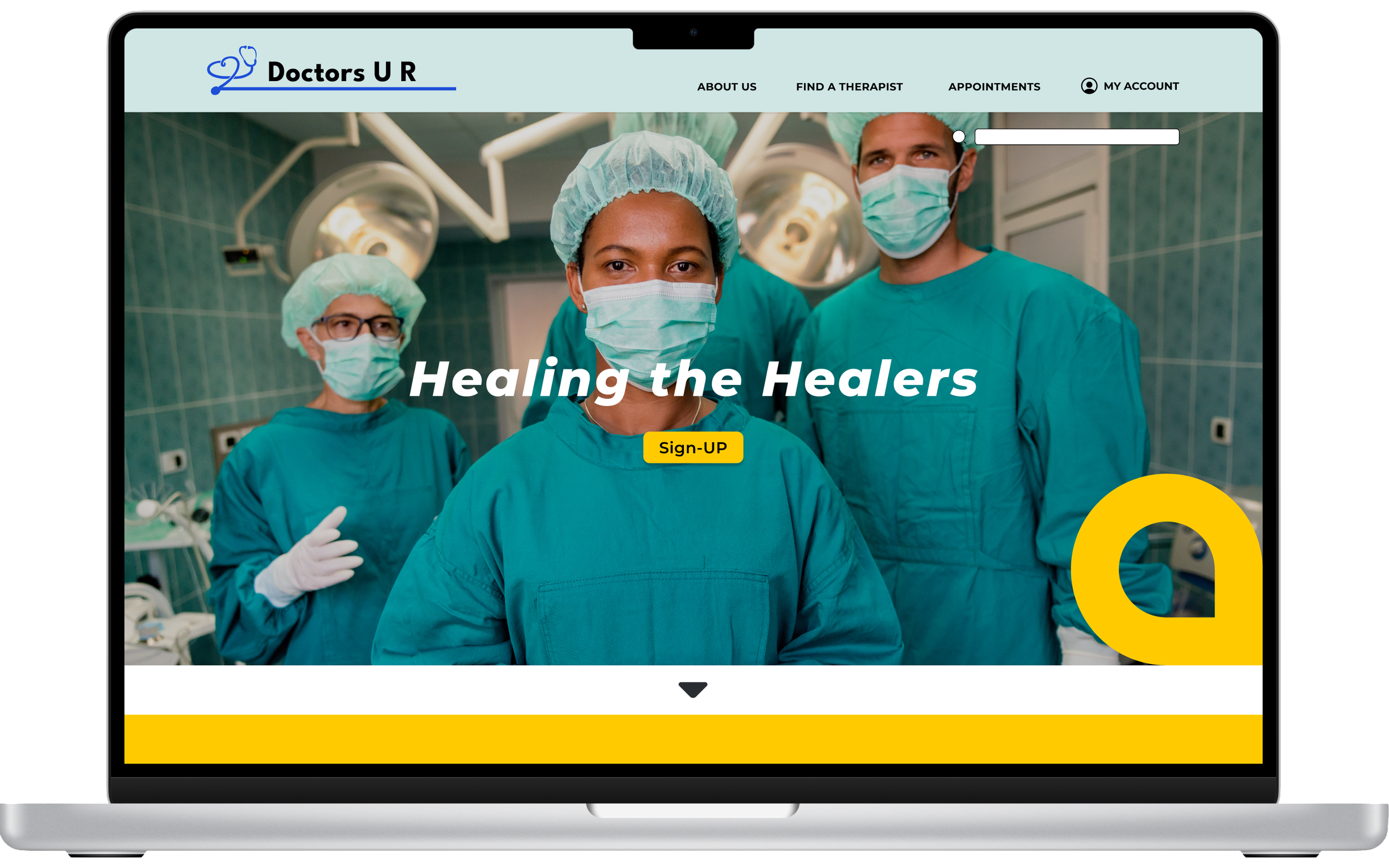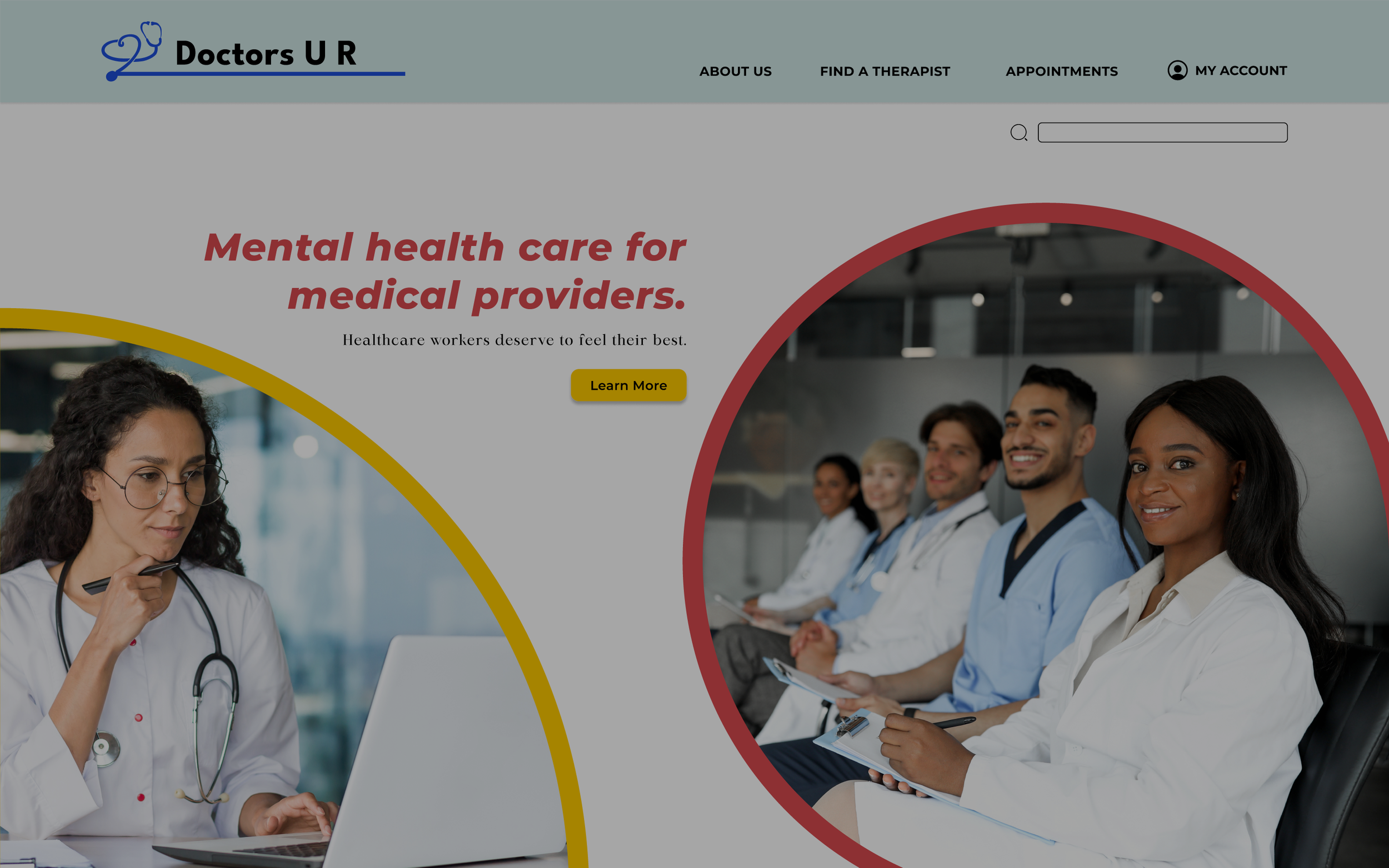Online Therapy for Healthcare Workers
Doctors U R enables medical professionals to easily connect with trained psychologists. It is similar to Talkspace and Betterhelp, but offers a unique service that is tailored for healthcare workers—psychologists are specifically trained to understand the unique needs of healthcare workers, providing more relevant and effective help. New users have the ability to quickly complete an intuitive questionnaire, submit their insurance information, review the profiles of recommended psychologists, book their initial virtual video appointment, and may begin chatting with their psychologist immediately.
Play Prototype Demo
The Full Case Study
Role: Design Lead
Over a three-week sprint, my team heavily researched the mental health industry, conducted interviews with medical professionals, synthesized our findings, theorized a solution, wire-framed and designed in Figma, directed usability tests, and finalized a high-fidelity prototype.
My team for this project consisted of Bridgette East: Research Lead, Kimberly Mannette: Project Lead, and I was the Design Lead.
About Doctors Under the Radar
Dr. Quidest Sheriff (Dr. Kiki) started Doctors Under the Radar in May of 2022. The goal is to acknowledge the issue mental health in the medical community and to encourage leadership participation. The website seeks to support healthcare workers and focuses on generating discussions around mental health in the medical field.
Currently, Doctors Under the Radar is an adequate site for statistics, information, and resources for medical professionals; however, it does not provide those medical professionals with easily actionable services.
Troubling Statistics
● 96% of medical professionals agree that burnout is an issue
● 40% of doctors with burnout say they lack resources
● 42% of physicians are reluctant to seek mental health treatment
● 53% of doctors with depression said it affected their work in 2021
● Suicide is the #2 cause of resident death (#1 for males, #2 for females)
Interviews
From surveys and interviews we were able to deduce that 57% of our medical professional interviewees are currently seeing a psychologist and/or psychiatrist, 43% have not used online mental health apps, and half of the users feel comfortable speaking to colleagues about their mental health.
Users are most concerned with privacy, empathetic & specialized therapy, vetted psychologists, financial support, and accessible key features.
Service Research
The Battle Within
Primarily focused on financial support, anonymity, and connecting users with therapists specifically trained to support frontline workers.
However, it only acts as a resource—users must go through multiple parties to seek the help they are looking for; this creates more work for the user and decreases the sense of security.
Talkspace & Betterhelp
Notorious on the market; this is due to accessibility, security, low-cost options, and ease of use. The virtual counseling sessions with licensed therapists can be a convenient and cost-effective alternative to traditional in-person therapy. This is a wonderful option for people with busy schedules and makes therapy more accessible to those who are unable to visit a therapist in person due to finances, geographical barriers, mobility issues, or scheduling conflicts.
However, when it comes to supporting healthcare workers; there is a lack of training and specificity with Talkspace and Betterhelp. The employed counselors, social care workers, and therapists do not meet the necessary standards for medical professionals who need empathetic psychologist that are specialized in trauma and fatigue.
Problem: Medical professionals find it difficult to easily, affordably & privately connect with specialized psychologists that can work alongside their altering and demanding schedules.
Storytelling
Solution: A confidential, accessible web application, with personalized communication methods —that connects medical professionals with vetted psychologists who are specifically trained and equipped to support healthcare workers that are experiencing burnout, trauma, anxiety, and depression.
Wireframe
As a personal practice, I tend to spend the most time on mid-fidelity wire-framing; this sets the precedent for a structured grid, hierarchy, typographic styles, necessary detail, and flow —before the distraction of color, imagery, and interaction specifics set in.
Usability Tests
The constructive feedback that needed to be addressed was for color accessibility and a slight heuristic violation of aesthetic and minimalist design due to the use of too many hue gradients; this analysis informed slight adjustments to the logo and color throughout.
Before
After
Onboard
● Unravel the mission
● Learn how the web application works
● Hear directly from Doctors U R psychologists
Questionnaire
● Demographic questions
● Choose psychologist preferences—to match the user with the most suitable psychologist
● Answer informed questions about personal mental health
● Breadcrumbs reassure the user of where they are at in the five-step set-up process
Account Setup
● Select between a Subscription Plan or Insurance/EAP verification
● Complete forms
● Reminded of complete confidentiality—users can even choose to keep all information private from and only share a preferred name
Begin Therapy
● Choose from suggested psychologists
● Read psychologist’s bio, credentials, and watch an informative video.
● Schedule first introductory appointment
● Begin anonymously chatting with personalized psychologist.
● May optionally upload a photo, review appointments, track progress, or seek immediate crisis support.
Before & After
By developing a solution-based web application, healthcare workers are now conveniently able to find trustworthy psychologists who are able to offer distinct, specialized support. Users are now able to find the help they need all in one place; whereas before they were only met with resources, and second-third party solutions. This site is a necessity for healthcare workers that are stretched too thin, especially during this Covid pandemic.





